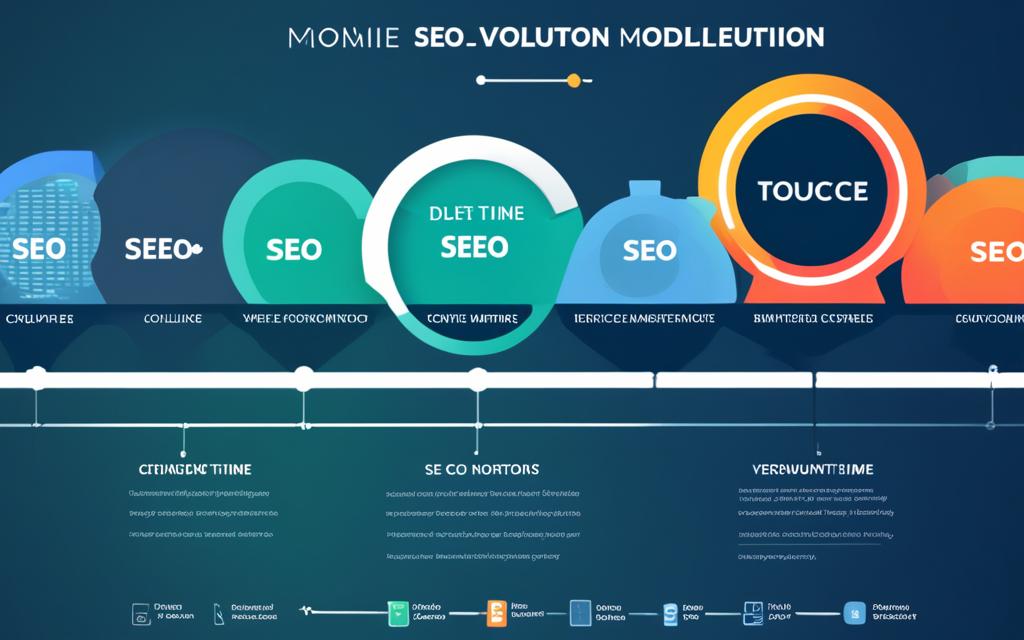Welcome to the world of advanced SEO techniques tailored specifically for competitive industries. If you are operating in a highly competitive market, it’s crucial to have a well-defined SEO strategy that can help you rise above your competitors and attract more visitors to your website.
In this section, we will explore various advanced SEO techniques that can give you the edge you need to excel in your industry. From understanding your market and conducting comprehensive keyword research to leveraging schema markup and implementing the latest technical SEO innovations, we will cover all the essential aspects of optimizing your website for maximum visibility and success.
Throughout this article, we will provide you with actionable insights and tips that you can implement right away. You will learn how to create compelling content strategies, build high-quality backlinks, and utilize advanced SEO techniques that are specifically designed for competitive industries.
Along the way, we will also share real-world examples and success stories from industry leaders who have effectively implemented these strategies to achieve remarkable results. So, buckle up and get ready to take your SEO game to the next level!
Let’s dive in and explore the advanced SEO techniques that will put you ahead of the competition!
Understanding Your Market
Before delving into advanced SEO techniques, it is essential to have a comprehensive understanding of your target market and the competitive landscape. By identifying and analyzing your market, you can develop effective strategies to outshine your competitors and gain a competitive edge in your industry.
Market research is the key to unlocking valuable insights about your audience, their needs, preferences, and behaviors. Take the time to gather data and gain a deeper understanding of your customers’ demographics, interests, and pain points. This information will enable you to create highly tailored content and targeted SEO campaigns that resonate with your audience.
Moreover, conducting competitor analysis is crucial in navigating competitive markets. Analyzing your competitors’ strategies, strengths, weaknesses, and positioning will provide you with valuable intelligence to inform your own SEO tactics. By understanding what works for your competitors, you can identify gaps and opportunities in the market, allowing you to position your business effectively and stand out from the crowd.
“Understanding your market and analyzing your competitors is essential for success in competitive industries.” – Marketing Expert
When analyzing your competitors, pay attention to their online presence, website structure, content strategy, keywords they target, and backlink profile. By studying their approach, you can gain insights into effective SEO techniques and adapt them to fit your unique value proposition. This analysis will help you identify untapped keywords, content gaps, and opportunities to differentiate your brand.
Remember, understanding your market is an ongoing process. Regularly monitor your target audience and competitors, keeping a pulse on the ever-changing landscape of your industry. Continuously adapt your SEO strategies to align with market trends, shifts in consumer behavior, and emerging opportunities.
The Importance of Understanding Your Market:
- Guides you in creating targeted content that resonates with your audience
- Helps you identify gaps and opportunities for differentiation
- Enables you to position your business effectively in competitive markets
- Provides valuable insights for developing highly tailored SEO campaigns
By investing time and effort into understanding your market and analyzing your competitors, you can lay a solid foundation for executing advanced SEO techniques that yield exceptional results. Next, we will explore advanced keyword research strategies, helping you unlock the power of relevant keywords to drive organic traffic and outrank your competitors.
Advanced Keyword Research
When it comes to SEO, keyword research is the foundation for success. But in competitive industries, basic keyword research just won’t cut it. To truly get ahead of your competitors, you need to dive deeper and master the art of advanced keyword research.
Advanced keyword research goes beyond simply finding popular keywords related to your industry. It involves identifying highly competitive keywords that can give you an edge in search engine rankings. By targeting these competitive keywords, you can position your website and content to outperform your rivals.
So, how can you conduct advanced keyword research? Here are some techniques to help you get started:
- Identify your target audience: Understanding your target audience is key to finding the right keywords. Consider their needs, preferences, and search habits to uncover the keywords they are likely to use when searching for products or services like yours.
- Utilize keyword research tools: There are numerous keyword research tools available that can provide valuable insights. Tools like SEMrush, Ahrefs, and Moz Keyword Explorer can help you discover competitive keywords, analyze their search volume and difficulty, and explore related keyword opportunities.
- Explore long-tail keywords: Long-tail keywords are longer and more specific phrases that have lower search volume but higher intent. They can be a goldmine for targeting niche audiences and capturing highly targeted traffic. Look for long-tail keyword opportunities that align with your content strategy.
- Optimize for user intent: Understanding the intent behind a keyword search is critical for creating relevant content. Keyword modifiers like “best,” “how to,” or “review” can indicate specific user intents. Tailoring your content to match these intents can help improve your search engine rankings.
- Keep an eye on your competitors: Competitive analysis plays a crucial role in advanced keyword research. Identify your top competitors and analyze the keywords they are targeting. Look for gaps and untapped opportunities that you can capitalize on to gain a competitive advantage.
By implementing these advanced keyword research techniques, you can uncover valuable insights and discover competitive keywords that can boost your search engine rankings. But remember, keyword research is an ongoing process. Regularly revisit and refine your keyword strategy to stay ahead of the competition.
Leveraging Schema Markup
When it comes to improving your website’s visibility in search engine results pages (SERPs), leveraging schema markup is a strategy that can give you a competitive edge. Schema markup allows you to provide search engines with structured data that helps them understand and interpret the content on your website more effectively. By implementing structured data, you can enhance your search results and attract more click-throughs, ultimately driving increased traffic to your site.
Schema markup uses a standardized vocabulary of tags to markup various types of content on your website, such as articles, events, reviews, products, and more. These tags provide additional context and information to search engines, enabling them to display rich snippets in their search results. Rich snippets include enhanced elements like star ratings, images, pricing, and availability, making your search results stand out and improving the chances of attracting user attention.
By including schema markup on your website, you can optimize your content for enhanced search results and improved visibility. Here are some key benefits of leveraging schema markup:
- Increased Click-Through Rates: Structured data helps your search results stand out from the competition, attracting more clicks from users who are actively searching for relevant information.
- Improved Search Engine Ranking: While schema markup itself is not a direct ranking factor, it can indirectly affect your search engine ranking by improving user engagement and click-through rates.
- Enhanced User Experience: Rich snippets provide users with additional information upfront, allowing them to make more informed decisions without having to visit your website.
- More Targeted Traffic: Schema markup allows you to provide more detailed information about your content, making it easier for search engines to match your website with users’ specific search queries.
To leverage schema markup effectively, it’s important to choose the appropriate schema types for your content and implement them correctly. You can refer to the Schema.org website for a comprehensive list of available schema types and documentation on how to implement them. Additionally, you can use Google’s Structured Data Markup Helper to generate the necessary code for your website.
When implementing schema markup, remember to focus on providing valuable information and enhancing the user experience. Avoid using schema markup in a spammy or deceptive manner, as this can lead to penalties from search engines and harm your website’s reputation.
By leveraging schema markup, you can take advantage of the power of structured data to improve your website’s visibility, attract more click-throughs, and ultimately drive more organic traffic from enhanced search results. Start implementing schema markup today and unlock the potential for enhanced search engine performance.
Technical SEO Innovations
Stay ahead of the competition with the latest technical SEO innovations that can supercharge your website optimization efforts. In this section, we explore key strategies to enhance your online presence and improve your search engine rankings.
Mobile-First Indexing: Embrace the Mobile Revolution
In today’s mobile-driven world, ensuring your website is optimized for mobile devices is crucial. With the rise of mobile-first indexing, search engines prioritize mobile content for ranking purposes. By implementing responsive design and optimizing your content for mobile users, you can capture a larger audience and improve your website’s visibility in search results.
Site Speed Optimization: Enhance User Experience
Website loading speed is a crucial factor in user experience and search engine rankings. Slow-loading websites often result in high bounce rates and decreased conversions. By implementing site speed optimization techniques, such as caching, image optimization, and minifying CSS and JavaScript, you can improve your website’s performance and provide a seamless browsing experience for your visitors.
Crawlability: Ensure Search Engine Accessibility
Search engines rely on web crawlers to discover and index your website’s pages. Optimizing your website’s crawlability ensures that search engines can effectively access and understand your content. By optimizing your website’s internal linking structure, creating a sitemap, and using robots.txt, you can enhance your website’s crawlability and improve its visibility in search engine results.
Structured Data: Harness the Power of Schema Markup
The effective use of structured data through schema markup can provide search engines with additional context about your website’s content, helping them understand and display it more effectively in search results.
By implementing schema markup, you can highlight important information on your website, such as product details, reviews, events, and more. This can enhance your search engine listings, drive more targeted traffic, and improve your website’s click-through rates.
Progressive Web Apps: Embrace the Future of Web Development
Progressive Web Apps (PWAs) combine the best features of websites and mobile applications, providing users with a seamless, app-like experience directly from their browsers. PWAs offer increased speed, offline functionality, and the ability to send push notifications, making them an ideal solution for businesses aiming to engage users and improve overall user experience.
Structured Data Example
| Feature | Benefits |
|---|---|
| Improved search engine visibility | Higher click-through rates |
| Enhanced user engagement | Increased organic traffic |
| Better understanding of website content | Improved search snippets |
By implementing these technical SEO innovations, you can optimize your website for improved visibility, deliver an exceptional user experience, and gain a competitive edge in your industry. Stay tuned for the next section, where we discuss content strategies specifically designed for high competition.
Content Strategies for High Competition
In today’s competitive digital landscape, standing out from the crowd requires strategic content creation. To succeed in high competition markets, you need to develop content strategies that not only capture the attention of your target audience but also rank well in search engine results. In this section, we will explore effective techniques to help you navigate the challenges of high competition and propel your website to the forefront.
Create Valuable and Relevant Content
When faced with high competition, focusing on creating valuable and relevant content is crucial. Research your target audience extensively and identify their pain points, preferences, and interests. By tailoring your content to address their needs and provide solutions, you can establish yourself as an authority in your industry.
Additionally, conduct thorough keyword research to identify the most relevant terms and phrases your target audience is searching for. Incorporate these targeted keywords strategically throughout your content, including in headers, subheadings, and body text. Remember, though, to prioritize user experience and avoid keyword stuffing, as search engines now prioritize high-quality, user-centric content.
Utilize Different Content Formats
High competition necessitates diversifying your content formats to engage with your audience effectively. Consider incorporating various multimedia elements such as videos, infographics, and interactive quizzes to make your content more engaging and shareable. Not only will this help capture attention, but it will also enhance your website’s overall user experience.
Stay Consistent and Regularly Update
In high competition markets, consistency is key. Establish a content schedule and stick to it, ensuring you consistently deliver valuable content to your audience. This helps build trust and loyalty while demonstrating your commitment to providing up-to-date information.
Furthermore, regularly update and optimize your existing content. Identify opportunities to improve and expand upon it, keeping it fresh and relevant. This not only boosts your website’s visibility but also helps you stay ahead in the competitive landscape.
Build Relationships and Leverage Guest Posting
Collaborating with other industry experts and thought leaders is an effective way to expand your reach and build authoritative backlinks. Reach out to relevant influencers and offer to contribute guest posts to their blogs or websites. By leveraging their established audience and sharing your expertise, you can attract more organic traffic to your own site.
Remember, establishing reciprocal relationships is crucial. Offer opportunities for guest posting on your own platform, enabling mutually beneficial collaborations that can elevate both your brand and the brands you partner with.
By implementing these content strategies for high competition, you can position yourself as a standout competitor in your industry. Remember, it takes time and dedication to achieve and maintain success, but with the right approach, your content can rise above the competition and drive substantial organic traffic to your website.
Building High-Quality Backlinks
When it comes to SEO, one of the most crucial factors for improving your website’s visibility and rankings is building high-quality backlinks. A strong backlink profile can significantly impact your organic search traffic and establish your website as an authoritative source in your industry.
To achieve this, you need effective link building strategies that focus on acquiring authoritative and relevant backlinks from reputable websites. Implementing these strategies will not only boost your SEO performance but also establish valuable connections within your industry.
Outreach Techniques
A successful link building campaign starts with reaching out to relevant websites and influencers in your niche. By building relationships and creating collaboration opportunities, you can earn backlinks from authoritative sources.
When conducting outreach, ensure that your emails are personalized, concise, and tailored to the recipient’s interests. Highlight the value of collaboration and explain how linking to your website will benefit their audience. Genuine and meaningful outreach is more likely to yield positive results and increase your chances of earning quality backlinks.
Guest Posting Opportunities
Guest posting is an effective way to showcase your expertise, expand your reach, and earn backlinks from high-authority websites. Look for reputable blogs or publications in your industry that accept guest posts and contribute valuable content that aligns with their audience’s interests.
When creating guest posts, focus on providing informative, well-researched, and original content that adds value to the host website. Including relevant and contextual links to your website within the guest post can effectively drive traffic and improve your website’s visibility.
Earning Authoritative Backlinks
Earning backlinks from authoritative websites can significantly elevate your website’s credibility and SEO performance. To do this, focus on creating high-quality content that naturally attracts links from reputable sources.
Invest time and effort in producing valuable resources, such as in-depth guides, research studies, or expert interviews. Promote your content through various channels, including social media, email outreach, and industry-specific forums, to increase its visibility and attract attention from authoritative websites.
Additionally, optimize your content for search engines by incorporating relevant keywords, adding informative headings, and structuring your content in a reader-friendly format.
By following these strategies, you can build a strong backlink profile that enhances your website’s authority, visibility, and organic search rankings. Remember, building high-quality backlinks requires consistent effort, persistence, and a focus on providing value to both your audience and the websites you collaborate with.
Conclusion
In conclusion, implementing advanced SEO techniques can give your website the competitive edge it needs in today’s digital landscape. By understanding your market, conducting advanced keyword research, leveraging schema markup, optimizing technical aspects, crafting high-quality content, and building authoritative backlinks, you’ll be well-positioned to achieve success in even the most competitive industries.
Elevate your online presence, drive more traffic, and outperform your competitors with these advanced SEO strategies. Remember to continuously monitor and adapt your approach to stay ahead in the ever-changing SEO landscape. Stay up-to-date with industry trends, algorithm updates, and consumer behaviors to ensure your website remains relevant and visible to your target audience.
By investing time and effort into implementing these advanced techniques, you can optimize your website’s performance and maximize its potential. It’s time to take your SEO game to the next level and establish yourself as a leading authority in your industry. Start implementing these strategies today and watch your website soar to new heights.







